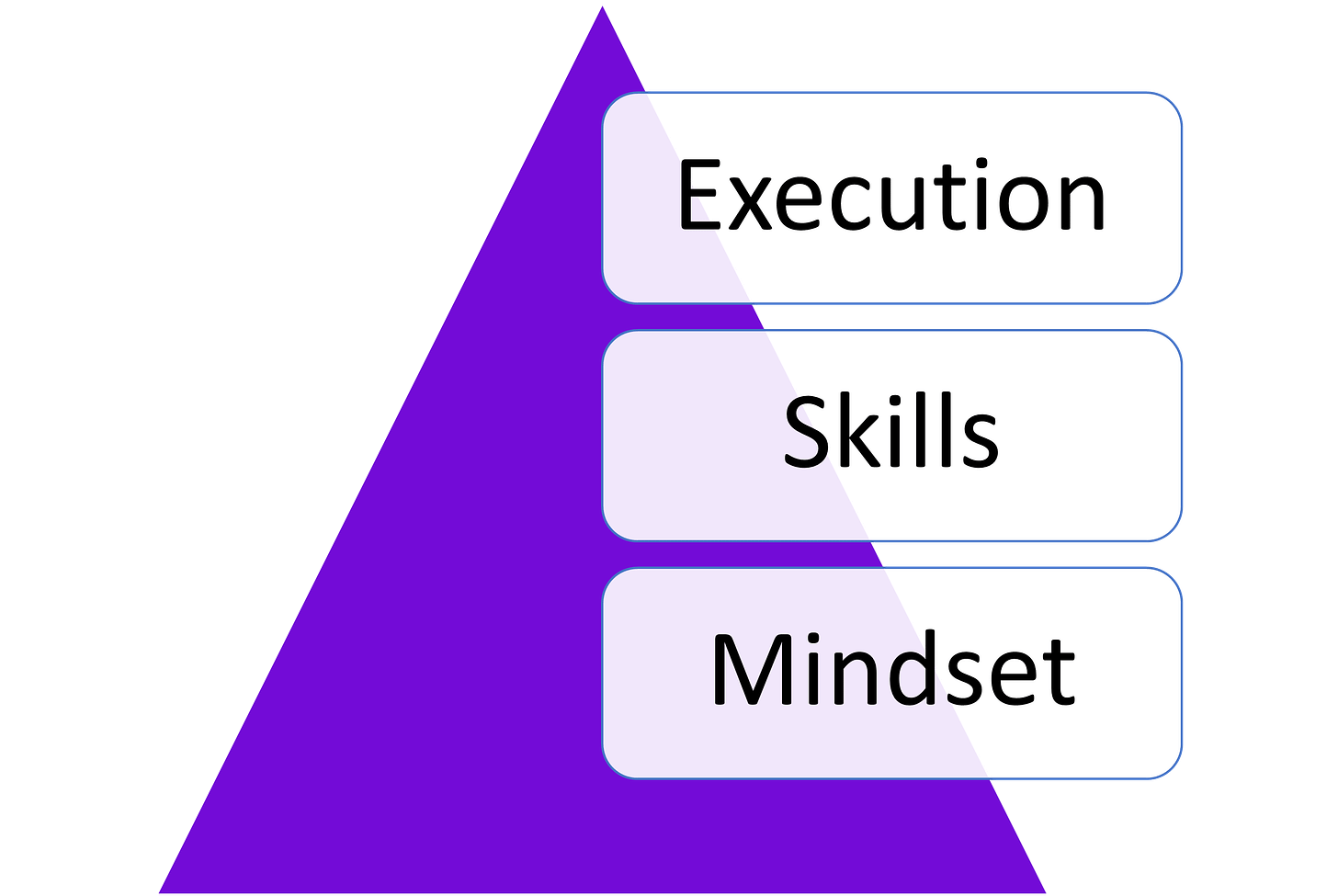Last week, we delved into the cosmic alignment between HR Tech and AI. Like Taylor and Travis, "We were meant to be." (See my LinkedIn post on T and T here,) Standing at the precipice of this incredible journey, how do we prepare ourselves for the mysteries ahead? What tools and allies can we develop for our journey?
While AI seems mysterious and daunting, harnessing its power within our organizations relies on a systematic approach we should take with any technology implementation. I use the pyramid below to visualize this approach.
The HR Tech Pyramid of Power
Like a pyramid, we build from the bottom with the foundational layer of 'Mindset'; in the middle, we add 'Skills,' and, at the apex, we finish with 'Execution.' Consider it Maslow's Hierarchy of HR Tech needs. Mastering each level ensures success as you climb to the top.
Level 1: Mindset – The Bedrock of Innovation
Mindset is the fertile soil from which your tech initiatives sprout. We ask and answer these questions before the project starts: "How does this tie to organizational objectives? What problem are we trying to solve? How will we ensure the users are on board?"
In a past project, I worked with a company replacing their existing applicant tracking system (ATS) with a new one. After discussing how we wanted the project to proceed, they adopted the slogan, "System functionality versus (company name) mentality." This slogan is an example of a mindset shift where they focused on best practices instead of historic practices.
You develop the habit of mindset shifts by asking hard questions at the beginning and end of the project. A project debrief is critical to ongoing success and will build your mindset muscles for the next project.
Level 2: Skills – Your Capability Framework
The right mindsets are essential, but they need training to turn a blank canvas into a work of art.
In my career, certifications in project management and Lean Six Sigma taught me frameworks for understanding the "Why" of a project, identifying root causes, building communication plans, and establishing accountability. These skills are essential to technology implementation success.
Other skills include:
Change Management: Identify detractors and supports and leverage their influence.
User-focused design: Build solutions around the employee.
Security and privacy management: Security roles, audits, and privacy laws.
Data analysis: Excel, SQL, visualization tools. Learn how to analyze and communicate data.
The good news is that plenty of resources are available to develop these skills. LinkedIn Learning, Udemy, and Coursera are all fantastic sources, and with the advent of Generative AI, learning is easier than ever. Check out this prompt from my friend Gary Butterfield to teach himself Python.
You can take your learning to the next level through community and practice. Finding like-minded practitioners to fill knowledge gaps and share resources is invaluable.
Level 3: Execution – Bringing It Together
Once you have a solid mindset and a well-stocked skill toolbox, execution is less daunting. In this phase, all your planning and preparation pay off. When selecting an AI solution, your mindset shapes your criteria, and your skills ensure smooth integration.
Best practices for this stage include:
Experimenting: Feel free to prototype, measure results, and refine. Your early tests show you what works and also build early support.
Communication: Communicating regularly throughout the project with the end users paves the way for easy adoption.
Ownership and Maintenance: Clearly define who owns what post-launch. Ongoing maintenance and support are just as essential as the product itself.
Never Stop Never Stopping
The pinnacle isn't the finish line. With an ever-changing landscape, revisit your mindset and skills and adapt as needed. Continuous improvement is the "secret sauce" to ongoing HR tech success.
In addition, this pyramid is not something you complete before progressing with a project. We will need to be agile and innovative. This framework gives you habits you can use amid implementation and grow as you move from project to project.
Concluding Thoughts
As stewards of employee data, we hold the reins of innovation. We're not just the "doers;" we are the architects in the ever-evolving landscape of HR Technology. By working through the HR Tech Pyramid of Power, we bring our preparation into practice and become masters of technology.
I can't iterate enough the importance of community on this journey. Seek out fellow adventurers and exchange knowledge.
I hope to be one of many guides for you on this journey. Please share your questions or comments, and let's meet 1:1. I would love to learn about your work and how the HRIS community can support you.
Reader Questions
Send me your questions at timwhitley@hrtechwizard.com, and I will answer them in future posts.
Interesting Stories from the Week
Top HR Tech Vendors Adding Generative AI Functionality
The hype train is rolling through! This week Workday and UKG announced upcoming Generative AI features to their line of HRIS products.
3 Ways to Prepare for the Future of Work by Jennifer Howard-Grenville and Laura Empson
The article suggests that leaders should adopt collective leadership to manage seismic shifts in the future of work, such as AI and hybrid models. Multi-stakeholder collaboration is essential for navigating changes in job roles and system architecture. Leaders should balance the emotional needs of employees while aligning with broader business goals. Being adaptive to organizational change and aware of generational priorities are key, particularly in the face of ongoing geopolitical and societal changes.
11 HR Trends for 2024: Elevating Work by Erik Van Vulpen
These are all important for HR Tech, but a few I would like to highlight as they directly impact our work:
Data-centric decision-making - More data that is quality and delivered quickly
Breaking down silos - Will see HR Tech professionals integrated into different teams even outside HR
AI & Automation - Need I say more?
Employee-centric design - A core principal of HR Tech Wizardry
HR Tech Career Opportunities
Disclaimer: Unless otherwise specified, I can’t speak to the quality of the job or the company. I am displaying jobs I have found online that seem to have broad appeal regarding job requirements and work location. If you have an HR tech job you would like me to highlight, please email it to me.
Sr. Analyst HR Technology - University of Chicago Medicine - Remote
HRIS Project Manager - NEOGOV- Remote/Austin, TX
HRIS Analyst - Medical Solutions- Remote
More Opportunities to Connect
LinkedIn https://www.linkedin.com/in/timwhitley1/





